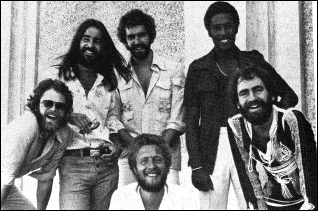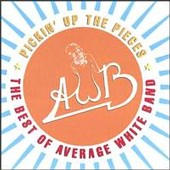|
Bassist Alan Gorrie, along with Onnie McIntyre, led an R&B band called Forevermore, while attending college in Perth. It was there that they first heard Dundee Horns, a rival group that featured Roger Ball and Malcolm "Molly" Duncan. Alan had written some songs he wanted to experiment with, so he booked some time in a local studio. He got Onnie, Roger, Malcolm, and some other friends to play on the session. When it was over, they realized that they had created their own individual sound, a kind of jazz-oriented soul, modeled after American bands such as James Brown's and Booker T and the MGs.
In 1972, the four joined Robbie McIntosh and Hamish Stuart to form a sextet. It was Bonnie Bramlett, of Delaney and Bonnie, who suggested their name -- the Average White Band. The group debuted later in the year at the Lincoln Festival in England. They did a lot of work all over Europe, playing American bases in Germany and many black clubs. In January 1973, the band achieved a major breakthrough by appearing as the supporting act at Eric Clapton's comeback concert at the Rainbow Theatre in London. After that, they entered a cheap demo studio and produced their first album, Show Your Hand, which they sold to MCA. In November, they made their first American tour, using equipment borrowed from the Who, and doing their own road work. The tour and the album were both bombs, and the group was quickly dumped from the MCA roster. Jerry Wexler, a co-founder of Atlantic Records, then signed the band and put them in the studio with arranger-producer Arif Mardin. He turned out to be just the man they needed to bring them their first real success.
Their second album, Average White Band, was full of disco music. The highlight was an instrumental, "Pick Up the Pieces," written by Roger and Hamish. It featured a tenor sax solo by Malcolm and the dual guitars of Onnie and Hamish. At first, the song was shunned by black stations because the band was chiefly white. But black youngsters -- and deejays -- loved it, and helped the band top the album and singles charts simultaneously in February 1975. "Pick Up the Pieces" was certified a million-seller by the RIAA on March 6 and was later nominated for a Grammy Award as Best R&B Instrumental of the Year (it lost, to MFSB's "T.S.O.P."). In the summer of 1975 there was a second Top 10 hit, "Cut the Cake." The music trade magazines were overflowing in awards to AWB, as they eventually became known, and awards from other publications, such as Playboy, were also numerous. Their "overnight" success left them reeling and wealthy -- so much so that they left Glasgow to become tax exiles in America. "In the United States," Steve Ferrone once said, "there is music all the time. This is the place to be." Steve would go on to be a replacement drummer for the fashion-conscious eighties powerhouse Duran Duran, while Hamish Stuart was a familiar face throughout Paul McCartney's Flowers in the Dirt 1989 world tour. That same year, Alan Gorrie, Onnie McIntyre, and Roger Ball enlisted vocalist Alex Ligertwood and re-formed AWB. The group has continued to perform into the nineties.
No comments so far, be the first to comment. |


